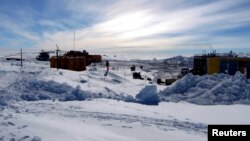A lake, buried under nearly four kilometers of Antarctic ice for more than 15 million years, might contain thousands of ancient organisms, including fish, according to a group of U.S. scientists.
The freshwater Lake Vostok, the fourth deepest lake on earth, is 250 kilometers long and 50 kilometers wide.
Researchers from Bowling Green State University, in Ohio, analyzed samples of the water taken by Russian scientists in 2012. In a report published in the online magazine PLOS One, the researchers say they identified more than 3,500 DNA sequences, almost all of them linked to various types of bacteria.
According to the report, about five percent of the DNA sequences were associated with more complex organisms called eukaryotes, and two of them were linked to one-celled organisms called archaea.
Some of the identified bacteria are common in fish guts, suggesting that the lake contains fish species.
Scientists also say that Lake Vostok may not be as sterile as previously thought and that most of the identified species are similar to those living in oceans or lakes. This may be disappointing for those who expected the waters to contain exotic creatures, isolated from the rest of the world for millions of years.
However, with more ice samples to be examined, the researchers say that surprising discoveries are still possible.
The freshwater Lake Vostok, the fourth deepest lake on earth, is 250 kilometers long and 50 kilometers wide.
Researchers from Bowling Green State University, in Ohio, analyzed samples of the water taken by Russian scientists in 2012. In a report published in the online magazine PLOS One, the researchers say they identified more than 3,500 DNA sequences, almost all of them linked to various types of bacteria.
According to the report, about five percent of the DNA sequences were associated with more complex organisms called eukaryotes, and two of them were linked to one-celled organisms called archaea.
Some of the identified bacteria are common in fish guts, suggesting that the lake contains fish species.
Scientists also say that Lake Vostok may not be as sterile as previously thought and that most of the identified species are similar to those living in oceans or lakes. This may be disappointing for those who expected the waters to contain exotic creatures, isolated from the rest of the world for millions of years.
However, with more ice samples to be examined, the researchers say that surprising discoveries are still possible.





